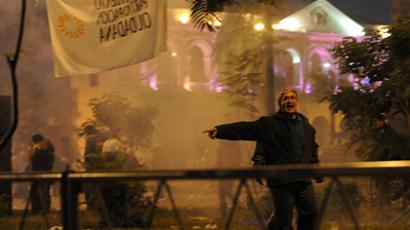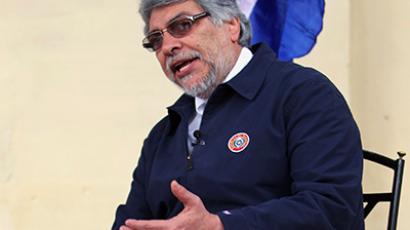Impeachment was very fast but totally legitimate - new Paraguayan president to RT
Paraguay's new President Federico Franco insists the power change and the ouster of his predecessor was fully constitutional. It took just 48 hours, because parliament’s main aim was to avoid any deaths of innocent people, he told RT.
Franco explained that the parliament decided to impeach Fernando Lugo after the people responsible for a massacre that claimed the lives of 17 people were promoted instead of being prosecuted. The new president also promised not to run as a candidate in the upcoming presidential elections in April and confirmed he will only remain in power till August 2013. Read the full transcript of RT’s interview with Federico Franco below.Federico Franco: It is a great pleasure for me to be here with you and your audience.I would like to start by saying that on Friday, the previous president of Paraguay was deposed and a new one was sworn in. There was already something in the air at three o'clock Wednesday after Fernando Lugo's last press conference. But it was only on Thursday morning at seven as the Liberal Party convened and decided to announce its impeachment verdict that I realized how serious the situation actually was. And I stressed it in my statement to the press.RT: What raises most doubts about the impeachment of Fernando Lugo is how quickly it all happened. This is why the regional stakeholders are questioning the extent to which this event was democratic. Do you agree it all happened very quickly?FF: Yes, this is exactly what I have just said. I agree it all happened so quickly I even don't have the relevant card for a president. We have yet to finalize all the formal stuff on my presidency. We only had two days to prepare my new office. I guess it was unusually quick for all of us, both at home and abroad. As I talked to parliament on the need to extend the transfer of power and give it an international dimension, as you have just mentioned, they told me the main thing is that the regime change should be 100 per cent peaceful.The fact that 120 out of 125 MPs voted for the impeachment clearly indicates that this decision was taken almost unanimously. A majority of 95 per cent of MPs is self-explanatory.RT: What if the reason for the differences is that the international community – at least UNASUR (The Union of South American Nations) and MERCOSUR (Southern Common Market, an economic and political agreement between Argentina, Brazil, Paraguay and Uruguay), which are going to expel Paraguay – views this hasty impeachment as a breach of democracy? What if they consider it illegitimate? Do you agree?FF: I totally disagree. There is a lot I have to say, especially to Argentina. But I will keep silent on that for now; the time is not yet right. This impeachment was fully constitutional. Fernando Lugo did have a right to legal defense and he made use of it. He had enough time to present his arguments. Before the impeachment procedure, President Lugo publicly declared he was ready for it. When he was deposed, he was free to leave the government. There was no use of force. The whole process was legal and constitutional.RT: What do you mean by hinting you have a lot to say? You are reluctant to discuss it to avoid interfering with home politics, aren't you?FF: These are smart questions. Why don't you comment on the recent coups in Argentina?RT: And yet you filed a claim against the expulsion of Paraguay from UNASUR and MERCOSUR. Do you think it will be satisfied?FF: We are indeed concerned about MERCOSUR, but not UNASUR.RT: And why is that?FF: Paraguay isn't even a member yet, and as far as I know, the accession has yet to be approved by the congress. MERCOSUR is important for us as a trade bloc that opens access for the country to use the regional market. With regards to UNASUR, our congress prefers to be cautious on a whole spectrum of issues – especially when it comes to individual provisions of the treaty we consider unfair.RT: It looks as if the Paraguayan government couldn't care less about the expulsion from UNASUR. Is there any other lesson you have drawn from this international reaction?FF: It's really no big deal for us.RT: At the very least, it shows that your ideological kindred spirits are leaders like Piñera, while Cristina Kirchner and Dilma Roussef are cut from a different cloth.FF: In fact, neighboring countries, I mean Argentina and Brazil, did play a major role. It was all schemed beforehand. And the saddest thing about it is that Venezuela was admitted to the Union without prior negotiations, on totally illegal and illegitimate grounds. And that was also the case with the expulsion of Paraguay. This is as clear as day.RT: You represent the Liberal Party. At what point did the Liberal Party disagree with Fernando Lugo's government?FF: On 15 June, six police officers and 11 farmers were brutally murdered, and the people responsible for this massacre promoted. I don't believe this has ever happened in any other country, that someone responsible for 17 deaths would be promoted to the post of a police commander. Those responsible for the incident that resulted in the deaths of 17 Paraguayans will certainly undergo trial for criminal negligence sooner or later. So, one guilty party became a police commander, and the other, a regional commander. At that point, legitimacy was breeched. The president could no longer do his job. This was something called 'serious mistakes while in office', and this was the reason parliament impeached him.RT: As I understand, the incident in the town of Curuguaty was the main reason for you?FF: That's right.RT: In 2011, Wikileaks posted a cable dated 2009 containing rumors about opposition plans to impeach Lugo and to topple him. Were you aware of this document? When did you learn about it?FF: No, there wasn't anything like that, it's all rumor. As for Wikileaks, nobody bears responsibility for it, not even the Department of State. As the country's leader, I am responsible for saying things the way they are. There had never been a real impeachment opportunity here. Receiving a third of the votes in both chambers of parliament isn't an easy job. You cannot just impeach at any time in any suitable situation; it's an extreme measure which demonstrates the ultimate discontent of the ruling classes, and public opinion. But this measure isn't taken for trivial reasons; it has profound motives behind it, something that could justify this action and unite people in it. This is something that's difficult to achieve in a country where five parties are united. You don't often see five parties united together, and one against them.RT: Let's talk about the power of parliament. As president, what difference do you see in the operation of the executive and the legislative branches of the power?FF: In my country, the constitution changed after 35 years of dictatorship. Under the 1992 constitution, the larger share of power belongs to the president. We became a presidential republic with a functioning parliamentary government. Parliament has a larger share of power than the executive or judicial branches.RT: I hope this system won't cause any difficulties in managing the country.FF: I hope so too. I'd like to see this issue end well. Paraguay doesn't need any more impeachments. As the country's governor, it is my task to work with all political circles and to establish a government based on the most gifted people. Politics is a science and the art of the possible. We should manage Paraguay in the most legitimate way and reach a consensus for all political circles.RT: You said that you wouldn't be running for the upcoming April election, and that you would remain in power until August 15th [2013] only. In your opinion, what will Paraguay face in the coming months? What are your key objectives for this period, and what changes are you expecting in the international reaction?FF: Indeed, I've made a firm decision not to run as a candidate. My desire to appease the country is one of the reasons for this decision. Secondly, I will not be participating actively in the election process in April. I'd rather work on ensuring my country is managed in such a way that the poorest segments of society, those who don't have even the basics, get practical assistance rather than just lip service. And thirdly, I will ensure I leave decent politics as a legacy for my successors. This includes, for instance, the energy sector, education, agriculture reform, as well as the modernization of the country's state institutions.














